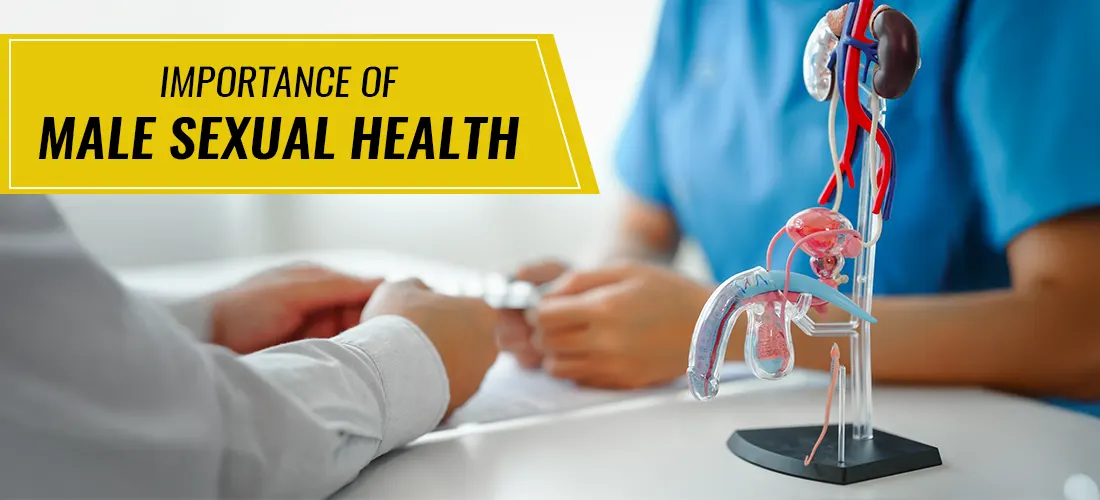Male sexual health is a vital, yet often underappreciated, component of a man’s overall wellness. For many men, the subject of sexual health is tied to physical performance and reproductive capability.
However, sexual health encompasses much more than functionality—it is closely linked to emotional resilience, mental clarity, and relational satisfaction.
Just as we consider physical fitness, mental health, and nutrition as pillars of wellness, male sexual health should also be viewed as a foundational element in achieving a well-rounded and balanced life.
In this article, we will take a comprehensive look at male sexual health, examining the underlying factors that influence it, the common challenges men face, and how addressing sexual health can play a transformative role in a man’s well-being.
By understanding male sexual health as an essential part of holistic wellness, we can better appreciate the positive effects that come with prioritizing and supporting it
Understanding Male Sexual Health
What Is Male Sexual Health?
Male sexual health extends beyond physical performance; it’s a combination of physical, emotional, and relational well-being. A healthy sexual life for men includes libido, erectile function, and mental well-being, each vital to a fulfilling intimate life and personal confidence.
Sexual health is also relational—it impacts interactions with partners, the ability to connect emotionally, and the trust within relationships.
Why Sexual Health Matters for Overall Health
Sexual health directly affects mental, emotional, and physical wellness. Healthy sexual function can boost self-confidence, alleviate stress, improve relationship quality, and promote overall happiness.
The mind-body connection in sexual health means that feeling good about oneself in intimate moments influences broader aspects of life. For example, a positive sexual life helps reduce anxiety, improve mood, and contribute to self-worth, all essential to mental wellness.
Recognizing this link encourages men to prioritize their sexual health as part of a balanced lifestyle, enhancing their overall quality of life.
Common Sexual Health Challenges for Men
Erectile Dysfunction (ED)
Erectile dysfunction (ED) is one of the most common sexual health concerns affecting men, especially as they age. Studies show that ED affects a significant percentage of men over 40 and its prevalence increases with age.
ED is often a multifaceted issue, stemming from factors such as age, lifestyle habits, medical conditions (like diabetes and hypertension), and mental health factors like stress or depression.
Addressing ED is important because it’s not only about sexual performance; it influences personal confidence, relationship quality, and emotional health.
Low Libido and Hormonal Imbalance
A decline in libido or decreased sexual desire is another issue impacting many men, often tied to hormonal imbalances and deficient testosterone. Testosterone influences energy levels, strength, and mood; declining levels can lead to fatigue and low vitality.
Psychological stress, lifestyle habits, and aging also contribute to low libido. Maintaining a healthy balance of hormones is crucial for overall vitality, supporting both sexual and physical wellness.
Performance Anxiety and Mental Health
Mental health plays a central role in sexual performance. Anxiety, stress, and depression can all impact libido and erectile function, creating a cycle where performance anxiety worsens with each experience.
When men are consumed by worries about their sexual performance, self-esteem, and relationship satisfaction can suffer.
Addressing these issues holistically—considering both mental and sexual health—can break this cycle, restoring self-confidence and emotional stability.
Physical Health Connection
Sexual Health and Cardiovascular Health
Sexual health and cardiovascular health are closely linked, as they share similar risk factors such as high blood pressure, high cholesterol, and obesity.
Poor cardiovascular health restricts blood flow, affecting erectile function and overall sexual vitality. Research suggests that ED can even be an early warning sign of cardiovascular issues, underscoring the need to treat cardiovascular and sexual health holistically.
Hormonal Balance and Vitality
Hormones like testosterone impact not only sexual drive but also physical strength, energy, and mood. As men age, testosterone levels gradually decline, which can affect libido, physical stamina, and motivation.
Hormonal balance is vital to overall vitality, influencing how men feel on a day-to-day basis. A proactive approach involving healthy lifestyle habits and potential supplementation can support hormonal health and maintain energy and resilience.
Energy Levels and Fitness
Sexual health issues can drain energy and reduce physical endurance. Low energy levels can decrease interest in intimacy, creating a feedback loop that affects self-esteem.
Regular physical activity and fitness routines boost libido and improve circulation, supporting both sexual and physical well-being. By staying active, men can increase sexual stamina, vitality, and sexual satisfaction.
Mental Health Impact
Self-Esteem and Confidence
Sexual health challenges can significantly impact self-esteem and confidence. Men who struggle with issues like ED or low libido often experience feelings of inadequacy or self-doubt.
Since self-esteem and sexual health are interconnected, addressing sexual health can build confidence, which in turn enhances mental well-being.
A balanced approach to wellness that considers sexual health helps men feel more self-assured and content.
Stress, Anxiety, and Relationship Satisfaction
Stress and anxiety can lead to or exacerbate sexual health problems, creating a cycle that negatively impacts both intimacy and relationship satisfaction.
In intimate relationships, sexual health issues may cause misunderstandings, decreased communication, and emotional distance.
By prioritizing sexual health and managing stress, men can improve their relationships, boosting mood and reducing the psychological burdens of stress and anxiety.
Mental Health Benefits of a Holistic Approach
A holistic approach to sexual health involves addressing both physical and mental wellness. Supplements, combined with lifestyle changes, can support a man’s overall sense of well-being.
Taking care of one’s mental health, reducing stress, and actively managing sexual health can create a positive feedback loop where one aspect reinforces the other, leading to greater happiness and life satisfaction.
Tips for Enhancing Male Sexual Health
Lifestyle Changes
Lifestyle adjustments can have a significant impact on sexual health. A balanced diet rich in nutrients, regular exercise, and effective stress management practices can improve sexual function and overall wellness.
Routine health checks allow men to monitor their health, while open discussions with healthcare providers can identify and address any underlying issues that might affect sexual health.
Supplements and Natural Remedies
Natural supplements are an additional tool for supporting male sexual health. These products often contain ingredients known to boost libido, circulation, and stamina.
Including supplements in a wellness routine can be beneficial for men looking to support their sexual health holistically.
FAQs
How does age impact male sexual health beyond hormonal changes?
Age can influence sexual health by contributing to a decline in physical fitness, cardiovascular efficiency, and mental resilience. These factors indirectly affect libido and performance, requiring a holistic wellness approach.
What role does sleep play in maintaining male sexual health?
Poor sleep quality or insufficient rest can lead to hormonal imbalances, reduced energy levels, and increased stress, all of which negatively impact sexual health. Prioritizing good sleep hygiene is essential.
Can certain medications affect male sexual health?
Yes, medications such as antidepressants, blood pressure medications, and some painkillers can influence libido and erectile function. Consulting with a healthcare provider can help address these side effects.
What environmental factors can affect male sexual health?
Exposure to environmental toxins, such as heavy metals and endocrine-disrupting chemicals, can impact hormonal balance and fertility. Avoiding harmful substances and adopting a clean lifestyle can help.
What are the early signs of declining sexual health that men should watch for?
Early signs include reduced interest in intimacy, difficulty maintaining erections, and unexplained fatigue. Addressing these symptoms early can prevent further complications.
How can men approach conversations about sexual health with their partners or doctors?
Open, non-judgmental communication with partners and healthcare providers is key. Preparing questions in advance and discussing concerns in a comfortable setting can help ease the conversation.
Final Thoughts on Men’s Sexual Health
Male sexual health is much more than a measure of physical performance—it is a reflection of one’s overall physical, mental, and emotional state. A man’s sexual health influences his self-confidence, energy levels, and relational harmony, reinforcing the need to treat it as a priority within his wellness routine.
Addressing sexual health issues, whether through lifestyle adjustments, open conversations with healthcare providers, or natural supplements, can help men feel more empowered, secure, and fulfilled.
A proactive approach to sexual health not only enhances personal well-being but also contributes to stronger, more satisfying relationships. Prioritizing sexual health can reduce stress, improve mood, and increase life satisfaction, enabling men to experience greater joy and purpose.
By integrating sexual health as a central part of self-care and wellness, men can ensure they are living balanced, resilient lives that support both their personal and relational happiness.
Taking small yet consistent steps—such as maintaining a healthy lifestyle, being attentive to mental wellness, and seeking supportive resources—can help men sustain vibrant, fulfilling lives.
Embracing male sexual health as an essential part of total wellness is key to achieving a holistic, rewarding, and lasting sense of well-being.




